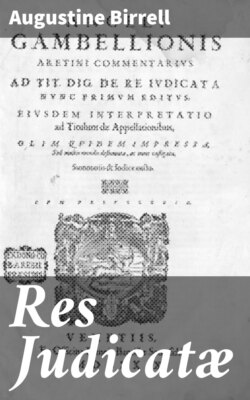Читать книгу Res Judicatæ - Birrell Augustine - Страница 5
На сайте Литреса книга снята с продажи.
EDWARD GIBBON
ОглавлениеTable of Contents
A LECTURE
'It was at Rome, on the 15th of October, 1764, as I sat musing amidst the ruins of the Capitol, while the bare-footed fryars were singing vespers in the Temple of Jupiter that the idea of writing the Decline and Fall of the City first started to my mind.
'It was on the day, or rather night, of the 27th of June, 1787, between the hours of eleven and twelve, that I wrote the last lines of the last page, in a summer-house in my garden. After laying down my pen I took several turns in a berceau, or covered walk of acacias, which commands a prospect of the country, the lake and the mountains. The air was temperate, the sky was serene, the silver orb of the moon was reflected from the waters and all nature was silent. I will not dissemble the first emotions of joy on recovery of my freedom and perhaps of the establishment of my fame. But my pride was soon humbled and a sober melancholy was spread over my mind by the idea that I had taken an everlasting leave of an old and agreeable companion, and that whatever might be the future date of my history, the life of the historian must be short and precarious.'
Between these two passages lies the romance of Gibbon's life—a romance which must be looked for, not, indeed, in the volumes, whether the original quartos or the subsequent octavos, of his history—but in the elements which went to make that history what it is: the noble conception, the shaping intellect, the mastered learning, the stately diction and the daily toil.
Mr. Bagehot has declared that the way to reverence Gibbon is not to read him at all, but to look at him, from outside, in the bookcase, and think how much there is within; what a course of events, what a muster-roll of names, what a steady solemn sound. All Mr. Bagehot's jokes have a kernel inside them. The supreme merit of Gibbon's history is not to be found in deep thoughts, or in wide views, or in profound knowledge of human nature, or prophetic vision. Seldom was there an historian less well-equipped with these fine things than he. Its glory is its architecture, its structure, its organism. There it is, it is worth looking at, for it is invulnerable, indispensable, immortal. The metaphors which have been showered upon it, prove how fond people have been of looking at it from outside. It has been called a Bridge, less obviously an Aqueduct, more prosaically a Road. We applaud the design and marvel at the execution.
There is something mournful in this chorus of approbation in which it is not difficult to detect the notes of surprise. It tells a tale of infirmity both of life and purpose. A complete thing staggers us. We are accustomed to failure.
